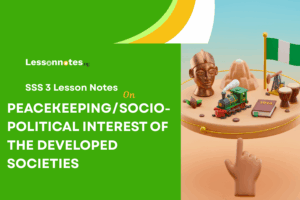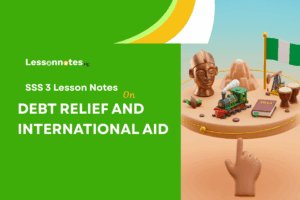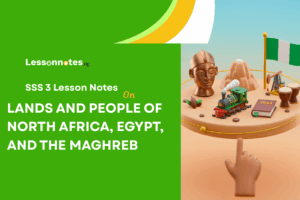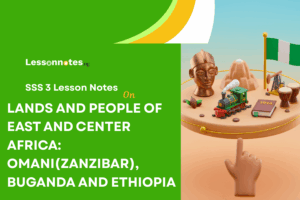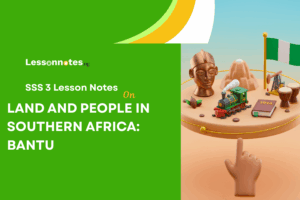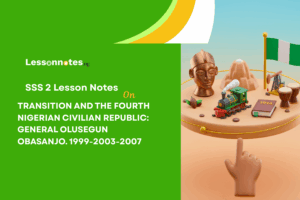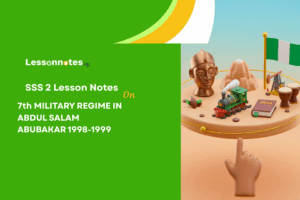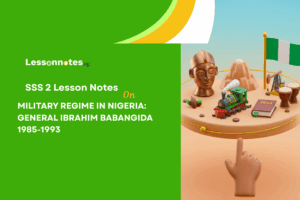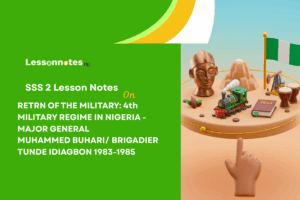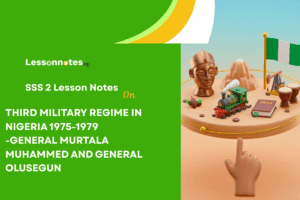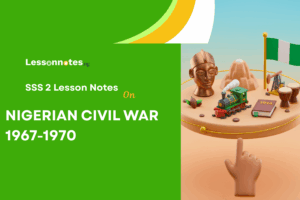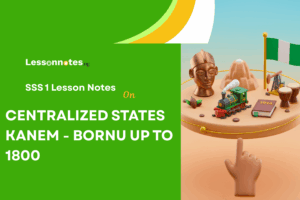THE IGBOS SS1 Nigerian History Lesson Note
Download Lesson NoteTopic: THE IGBOS

The Igbo people are one of the largest ethnic groups in Africa. They live mainly in southeastern Nigeria, in an area that is often called Igboland. With a population of over 40 million, the Igbo have a rich history, unique culture, and interesting ways of organizing their society. This lesson will explore who the Igbo people are, their origins, how they lived in the past, their beliefs, their achievements, and their role in Nigerian history.
Origins and Early History
Who Are the Igbo?
The Igbo (sometimes spelled Ibo) are a distinct cultural group:
- They speak the Igbo language, which has many dialects
- They traditionally live in southeastern Nigeria
- Their homeland is mainly east of the Niger River
- They live in states like Abia, Anambra, Ebonyi, Enugu, and Imo
- Many also live in parts of Delta and Rivers states
- The Igbo have a population of over 40 million people
- They are one of Nigeria’s three largest ethnic groups
- Known for their entrepreneurial skills and achievements in education
- Have a rich cultural heritage spanning thousands of years
- Many Igbo people now live in other parts of Nigeria and around the world
Origins of the Igbo
There are different ideas about where the Igbo came from:
- Archaeological evidence shows people have lived in Igboland for thousands of years
- The Igbo likely developed in their present location over many centuries
- Some traditions say they came from the north or northeast
- Others believe they have always lived in their current homeland
- The ancient site of Igbo-Ukwu (9th century) shows early Igbo civilization
- Bronze artifacts from Igbo-Ukwu reveal advanced metalworking skills
- Unlike some other groups, the Igbo did not have a single migration story
- Different Igbo communities have different origin stories
- They likely developed from various smaller groups who gradually formed a common identity
- Language and cultural similarities united these different communities
Early Settlements
The Igbo created distinctive settlement patterns:
- Typically lived in small, scattered villages rather than large towns
- Villages were often organized around a common ancestry
- Several villages together formed a clan or village-group
- Built homes using mud, wood, and palm materials
- Created compounds for extended families
- Chose locations near farmland and water sources
- Cleared forest areas for settlement and farming
- Built meeting houses and market spaces in village centers
- Some areas had defensive walls and ditches for protection
- Sacred groves and shrines marked important spiritual locations
Political and Social Organization
Decentralized Democracy
Unlike many other African groups, the Igbo had no kings:
- Often described as “acephalous” (without a head) or having a “republican” system
- Most decisions were made through village assemblies
- All adult men could participate in these meetings
- Women had their own separate but powerful organizations
- Used a consensus-based approach to decision-making
- Leadership was based on achievement, not birth
- Titled men (Nze or Ozo) had influence but not absolute power
- Different villages governed themselves independently
- Alliance systems connected different communities
- This system has been called “village democracy”
The Title System
Achievement was recognized through titles:
- Men could earn titles like Ozo or Nze
- Required payment of fees and performing rituals
- Titled men formed councils that helped govern
- Titles showed social status and achievement
- Title holders wore special insignia and clothing
- Had special privileges and responsibilities
- Could speak with authority at village meetings
- Not based on birth but on personal achievement
- Women could also earn certain titles
- Title systems varied among different Igbo communities
Age Grade System
Age groups helped organize community life:
- People born around the same time formed an age grade
- Moved through life stages together
- Young men’s age grades provided labor for community projects
- Helped maintain roads, clear brush, and build public structures
- Served as a defense force when needed
- Enforced community decisions and rules
- Created bonds across family lines
- Helped integrate young people into adult society
- Women also had age grade associations
- This system provided structure and organization without centralized authority
Masquerade Societies
Secret societies used masks for social control:
- Masked figures represented ancestral spirits
- Only initiated men knew the secrets behind the masks
- Different masks had different functions
- Some enforced moral and social codes
- Others entertained or commemorated events
- The Ekpe, Okonko, and Mmuo societies were important examples
- Women had to stay indoors during certain masquerades
- Masquerades had both religious and political functions
- Helped maintain social order
- Connected the living with the spiritual world
Family Structure
The family was the basic social unit:
- Extended families lived in compounds
- Patrilineal system (family line traced through fathers)
- Polygamy was common (men could have multiple wives)
- Each wife typically had her own house within the compound
- Children belonged to their father’s lineage
- Strong emphasis on kinship ties
- Family heads made important decisions
- Elders were highly respected
- Children were valued and raised by the entire extended family
- Marriage created alliances between different families
Gender Roles and Women’s Position
Women had unique powers in Igbo society:
- The “dual-sex” political system gave women their own organizations
- Women’s councils made decisions on matters affecting women
- Market trade was often dominated by women
- Women controlled certain crops and food production
- Could protest against men’s bad behavior through “sitting on a man”
- Women’s associations enforced standards of behavior
- Daughters (Umuada) had special powers in their birth families
- Motherhood conferred high status
- Some women held religious offices as priestesses
- Famous women like Omu Okwei became powerful traders
The “Osu” System
Social stratification existed in traditional Igbo society:
- Osu were people dedicated to deities or shrines
- Considered separate from the rest of society
- Not allowed to marry non-Osu people
- Faced various social restrictions
- Often lived near shrines or temples
- The system created a form of social inequality
- Similar to caste systems in other societies
- Christianity later opposed this practice
- Modern Igbo society has worked to eliminate this discrimination
- Laws now prohibit Osu discrimination, though some attitudes persist
Economic Activities
Agriculture
Farming was the foundation of Igbo life:
- Yams were the most important crop and symbolized masculinity
- Cassava became important after its introduction
- Women grew crops like cocoyams, beans, and vegetables
- Palm trees provided oil, wine, and building materials
- Kola nuts were grown for ceremonies and trade
- Used hoes, machetes, and digging sticks as farming tools
- Practiced crop rotation to maintain soil fertility
- Created garden plots around homes
- Farmed more distant fields for major crops
- Held festivals to mark agricultural cycles
Trade and Markets
Trade was highly developed:
- Regular markets held on specific days
- Market days rotated among different villages
- Long-distance trade connected Igbo with other regions
- Trading networks crossed ethnic boundaries
- Women dominated local market trade
- Men typically handled long-distance trade
- Used cowrie shells and metal rods as currency
- Later adopted British coins
- Famous trading centers included Bende, Uburu, and Onitsha
- Trade created wealth and status for successful merchants
Crafts and Industries
Specialized production was well-developed:
- Blacksmithing created tools and weapons
- Wood carving for masks, doors, and household items
- Pottery making, often by women
- Weaving of cloth from cotton and raphia
- Basket making using local fibers
- Palm oil processing
- Body art and decoration
- Leatherworking
- Medicine preparation
- These crafts were organized through family specialization and apprenticeship
Religious and Cultural Practices
Traditional Religion
Spiritual beliefs shaped Igbo life:
- Belief in a supreme creator god called Chukwu or Chineke
- Many smaller deities (Alusi) with specific functions
- Veneration of ancestors (Ndichie)
- Earth goddess (Ala or Ani) was especially important
- Personal guardian spirit (Chi) for each person
- Use of divination to understand spiritual messages
- Oracles like the famous Arochukwu oracle guided decisions
- Priests and priestesses served as spiritual intermediaries
- Sacred animals, trees, and locations
- Spiritual forces explained events in the natural world
Art and Material Culture
The Igbo created distinctive artistic forms:
- Masks for various ceremonies and masquerades
- Mbari houses with elaborate sculptures and paintings
- Body art including scarification and painting
- Decorated doors and house posts
- Pottery with geometric patterns
- Bronze and brass casting
- Textiles with unique patterns
- Musical instruments including drums, flutes, and string instruments
- Household items decorated with symbolic designs
- Art was both beautiful and spiritually meaningful
Music and Dance
Performance arts were central to community life:
- Different music for different occasions
- Complex drumming patterns
- Use of xylophones, flutes, and horns
- Call and response singing styles
- Dance forms for celebrations, mourning, and spiritual events
- Age grades performed special dances
- Music accompanied life cycle events
- Professional musicians at important ceremonies
- Dance competitions between villages or groups
- Songs preserved history and cultural values
Language and Oral Traditions
The Igbo preserved knowledge through speaking:
- Rich oral literature including proverbs, stories, and riddles
- Proverbs (ilu) were especially important in speech
- Stories explained origins, moral lessons, and natural phenomena
- Professional storytellers entertained and educated
- History was preserved through oral accounts
- Praise names recorded personal achievements
- Special language forms for ceremonies and rituals
- Talking drums could communicate messages over distances
- Names often contained meaningful messages
- Oratory was highly valued and developed
Contact with Europeans and Colonial Era
Early European Relations
Initial contacts were mainly through trade:
- Portuguese reached the coast in the 15th century
- European trade focused first on slaves, later on palm oil
- Coastal Igbo communities served as middlemen
- Interior communities had less direct contact
- European goods like cloth, alcohol, and guns were imported
- Igbo traders adapted to new opportunities
- Christian missionaries began arriving in the 19th century
- Trading stations established along rivers
- Some Igbo became interpreters and cultural brokers
- European accounts described Igbo communities and practices
The Slave Trade
The trans-Atlantic slave trade deeply affected Igboland:
- Many enslaved people from West Africa were Igbo
- Some were captured in wars or raids
- Others were condemned for crimes
- Some were kidnapped by slave traders
- Created insecurity and disruption
- Changed warfare patterns and social relations
- Led to defensive settlement patterns
- Some communities created alliances for protection
- Left lasting impacts on population and development
- Igbo culture continued in the Americas, especially in places like Jamaica and Haiti
British Colonial Rule
European influence eventually led to colonial control:
- British influence increased through the 19th century
- Formal colonial rule began after the Berlin Conference (1884-1885)
- Initially used “indirect rule” through “warrant chiefs”
- This system failed because it contradicted traditional Igbo democracy
- Igbo areas were administered as part of Southern Nigeria Protectorate
- Colonial taxes and labor demands caused hardship
- New Western-style courts replaced traditional justice
- Roads, schools, and hospitals were built
- Christianity spread rapidly in many areas
- Traditional political and religious systems were undermined
The Aro Expedition and Resistance
The Igbo resisted colonial rule in various ways:
- The British attacked the Arochukwu oracle in 1901-1902
- This “Aro Expedition” aimed to destroy Aro influence
- The Women’s War of 1929 was a major protest against colonial policies
- Thousands of women demonstrated against taxation and other issues
- Some communities refused to pay taxes
- Religious movements opposed European influence
- Passive resistance through non-cooperation
- Cultural practices continued despite disapproval
- Written petitions and appeals challenged unfair policies
- These responses showed Igbo determination to maintain autonomy
Adaptation and Change
The Igbo responded to new realities:
- Embraced Western education enthusiastically
- Converted to Christianity in large numbers
- Formed improvement unions to develop their communities
- Created new political organizations
- Adapted traditional institutions to changing times
- Became active in nationalist movements
- Developed new forms of art and literature
- Combined traditional and Western medicine
- Modified farming practices with new crops and techniques
- These adaptations showed remarkable flexibility and pragmatism
Modern Igbo Society and History
The Nigerian Civil War
A tragic conflict deeply affected Igbo history:
- After Nigeria’s independence in 1960, political tensions grew
- Military coups in 1966 led to killing of Igbo in northern Nigeria
- Eastern Region, led by Colonel Ojukwu, declared independence as Biafra
- Civil war lasted from 1967 to 1970
- Estimated 1-3 million people died, many from starvation
- After defeat, Biafra was reintegrated into Nigeria
- The war remains a defining event in Igbo consciousness
- Post-war policies aimed at “No victor, no vanquished”
- Economic recovery took decades
- The experience strengthened Igbo identity in many ways
Cultural Resilience
Despite challenges, Igbo culture continues to thrive:
- Traditional festivals still celebrated
- New Yam Festival (Iriji or Iwa ji) remains important
- Marriage customs maintain distinctive elements
- Music and dance forms evolve while preserving traditional elements
- Language preservation efforts ongoing
- Traditional religion practiced alongside Christianity
- Community development still often organized through hometown associations
- Cultural values of hard work and achievement remain strong
- Modern literature, film, and art draw on Igbo heritage
- Pride in Igbo identity remains powerful
Economic Activities
Entrepreneurship continues to be an Igbo strength:
- Known throughout Nigeria for business acumen
- Trading remains an important occupation
- Manufacturing and industry developed in cities like Aba and Onitsha
- Professional occupations in medicine, law, and engineering
- Strong emphasis on education as path to success
- Remittances from Igbo living abroad support local development
- Agriculture still important but less dominant than before
- Technology and service industries growing
- Apprenticeship systems adapted to modern business
- Economic networks extend globally
Notable Achievements
The Igbo have contributed significantly to Nigeria and the world:
- Literary giants like Chinua Achebe and Chimamanda Ngozi Adichie
- Political leaders including Nnamdi Azikiwe, Nigeria’s first president
- Scientists, physicians, and academics making global impacts
- Musicians and artists gaining international recognition
- Business leaders and entrepreneurs
- Sports figures including many football (soccer) stars
- Religious leaders of various faiths
- Community developers and activists
- Military leaders and statesmen
- These achievements reflect the Igbo emphasis on personal accomplishment


